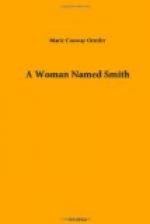At that moment, from somewhere—it seemed to us from up-stairs—a sudden flood of sweetest sound poured goldenly through that sad, dim, dusty house, as if a blithe spirit had slipped in unawares and was bidding us welcome. For a few wonderful moments the exquisite music filled the dark old place and banished gloom and neglect and decay; then, with a pattering scamper, as of the bare, rosy feet of a beloved and mischievous child making a rush for his crib, it went as suddenly as it had come. There was nothing to break the silence but the swishing downpour of the outside rain.
When I could speak: “It came from up-stairs! Somebody’s playing a violin up-stairs. I’m going up-stairs to find out who it is.”
Alicia demurred: “It may be a real person, Sophy!—a real person with a real violin. But I’d rather believe it’s Ariel’s self, come out of those pink crape-myrtles. Don’t go up-stairs, please, Sophy!”
“Nonsense!” said I. “Somebody’s played a violin and I mean to know who he is!”
And up-stairs I went, into a huge dark hall, with the cross-passage cutting it, and closed doors everywhere. At the front end was a most beautiful window, opening doorlike upon a tiny iron bird-cage of a balcony, hung up Southern fashion under the roof of the pillared front porch. At the rear a more ordinary door opened upon the broad veranda that ran the full width of the house. Both door and window were closed, and bolted on the inside, and the big, dark, dusty rooms which I resolutely entered were quite empty, their fireplaces boarded up, their windows close-shuttered. There was no sign anywhere of violin or player. I went down-stairs just as wise as I had gone up.
“I told you it was Ariel!” Alicia stood by the open window—our windows are sunk into the walls, and cased with solid black walnut as Impervious to decay as the granite itself—and leaned out to the wet and dripping garden.
“Sophy,” said she, in her high, sweet voice that carries like a thrush’s. “Sophy, the best thing about this world is, that the best things in it aren’t really real. This is one of its enchanted places. Sycorax used to live in this house: that’s what you feel about it yet. But now she’s gone, her spell is lifting, and Hynds House is going to come alive and be young again!”
“At least,” I grumbled, “admit that the dust inside and the rain outside and the weeds and mud are real; and I’m really hungry!”
“Me too!” Alicia assented instantly and ungrammatically. “Oh, for a square meal!” She thrust her charming head out far enough for the rain to splatter on her bright hair and whip it into curls, and bring a deeper shade of pink to her cheeks, and a deeper blue to her eyes. “Ariel!” she fluted, “Spirit of the Violin, I’m hungry—earthily, worm-of-the-dustly, unromantically hungry! Send us something to eat.”
“Why don’t you rap on one of the tables,” I suggested ironically, “and call up your high spirits to do your bidding?”




